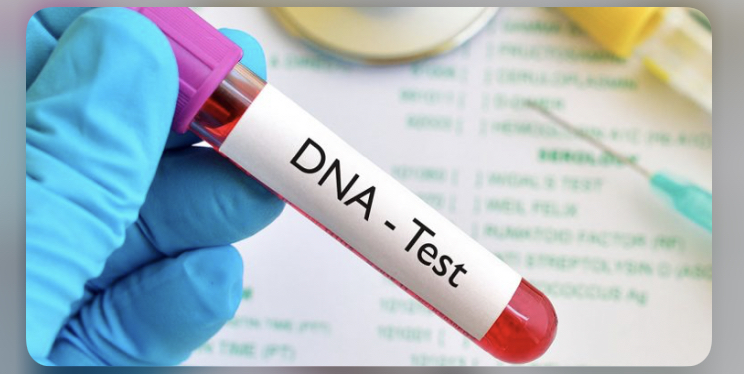
Fresh concerns have trailed the release of the 2025 Annual DNA Testing Report by a testing centre in Lagos, which revealed that Nigeria’s paternity exclusion rate currently stands at 25 per cent.
This means one in every four men tested is not the biological father of the child in question.
The report, released during the week by Smart DNA, also showed that firstborn children were the most affected in paternity disputes, with firstborn sons accounting for 64 per cent of negative results.
Across the country, the revelations have continued to fuel public debate, with many men stating that they would subject their children to DNA tests to confirm their paternity and erase doubts raised by the report.
A Lagos-based tech entrepreneur, Samuel Adegbite, stated that he was considering conducting a DNA test for his children.
In an interview with Saturday PUNCH, he said, “I had never actually given serious consideration to conducting a DNA test on my children, but with this recent news, and the types of things I am hearing these days, it is something I will do soon.
“I actually trust my wife and I even feel bad thinking about it. But, it’s just something I need to do for my peace of mind. I believe every man has a nagging feeling that ‘what if’, and I just want to be sure of the paternity of my children once and for all.”
A genetic and molecular expert with Easy Genetics, which partners Alpha Bio Labs in the United Kingdom and Universal Forensics in the United States, Dede Gilbert, explained the science and realities behind paternity testing.
He said, “Everyone has 23 pairs of chromosomes. 22 are autosomes while the last pair is the sex chromosome, which determines a person’s gender.
“During DNA testing, all 23 pairs are analysed, and we also calculate the combined paternity index to make sure the result is accurate.
“There is maternity and paternity testing, and what we call avuncular testing, which is used to establish sibling relationships.”
He further clarified how testing works.
“If it’s a paternity test, we take a sample from the alleged father and the child. For a maternity test, we use the mother’s sample. When the father is not available for a paternity test, his sibling, preferably a male, can be tested.”
On the cost, he noted that prices depended on the laboratory handling the analysis and could vary between N400,000 and N1m.
Responding to why physical resemblance can be misleading, the expert said, “It is very possible to look like someone who isn’t your biological parent. I have seen people who look like me or even my friends. That is called phenotype. Every little child, at some point, looks like everybody. It’s as they grow older that physical traits become more distinct. If your child resembles you, it will be obvious, but once you have reasons to doubt, a test is the surest way to know.”
On the rise in reported negative paternity results, he stressed that the statistics were often misunderstood.
“People who come for DNA tests are not a random sample of society; they usually have strong suspicions already.
“For example, if a couple is living peacefully and the man notices inconsistencies—say his wife claims to be at a conference but is seen elsewhere—that could trigger the need for a test. Others seek testing for immigration purposes, since proof of biological relationship is required when relocating with a child. Some do it because of legal disputes. So, these statistics are not a true reflection of the entire population. In statistics, we regard such a group as a ‘skewed population,’ and you cannot use their results to judge the whole.”
In a similar vein, a DNA consultant, Ayodele Adeniyi, explained that while the demand for the test was rising, DNA testing was not a routine medical requirement.
He said, “Two to three out of 10 cases we have handled came back showing the man is not the father, but this is not a direct representation of the population. Many people who come to us already have suspicions, such as catching a wife cheating or following rumours. The tests are carried out in the United States, and take about two weeks.”
A nurse with Surge Healthcare in Abuja, Happiness Ogenyi, urged families to conduct DNA tests if they had the resources.
Paternity fraud has become a recurrent trend in the entertainment industry where DNA scandals have made headlines.
The most recent and emotionally charged case involved the late singer, Ilerioluwa Aloba, popularly known as Mohbad, whose sudden death in September 2023 remains shrouded in controversy.
The paternity of his son, Liam, became a subject of heated debate after Mohbad’s father, Joseph Aloba, openly demanded a DNA test to establish whether the boy was truly his grandson.
Mohbad’s saga is only the latest in a long list of celebrity DNA controversies.
Afrobeats superstar, Davido, for instance, has repeatedly found himself entangled in paternity disputes.
Over the years, several women have claimed he fathered their children, leading to public confrontations and DNA tests.
One of the most prominent cases involved Ayotomide Labinjo, who alleged she had a daughter, Aanuoluwapo, for the singer after a relationship in 2013.
She claimed that Davido cut off communication after she announced her pregnancy.
Labinjo further alleged that when a test was arranged by Davido’s father, the result—stating Davido was not the biological father—was manipulated, insisting it was only a blood test and not a DNA analysis.
Davido’s family, however, denied the allegation.
His brother, Adewale Adeleke, insisted the test was properly conducted in the presence of all parties and was conclusive.
Despite the negative result, in an X post on March 17, 2017, Davido said the family offered financial assistance to the mother out of pity.
“Upon finding out the test results were negative Out of pity we still give dem money,” he wrote.
Another celebrity whose personal life was dramatically altered by a DNA revelation is On-Air Personality, Chinedu Emmanuel, popularly known as Nedu Wazobia.
- 91
-
0
- 0
- 0
- 0
